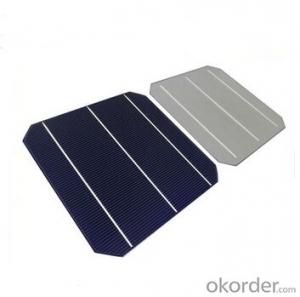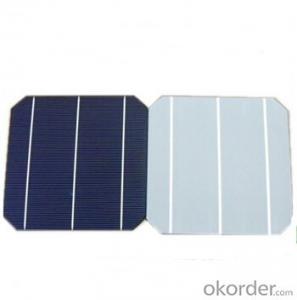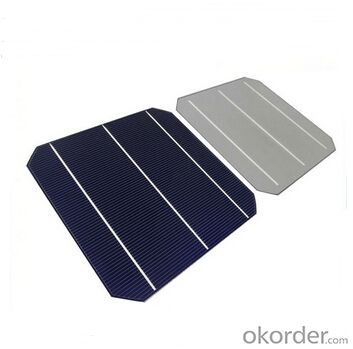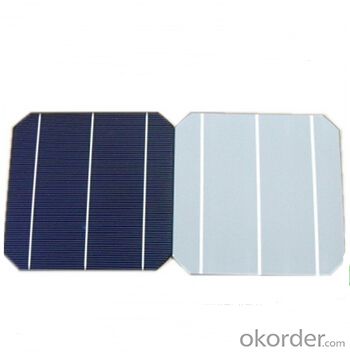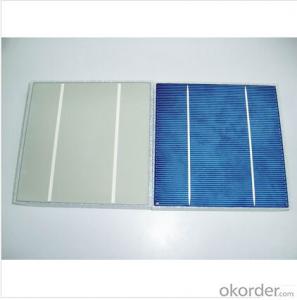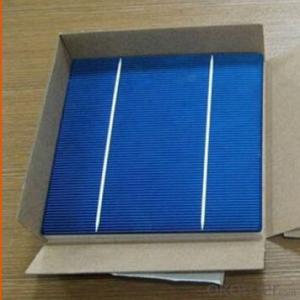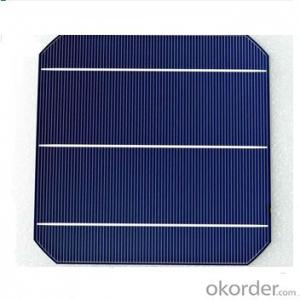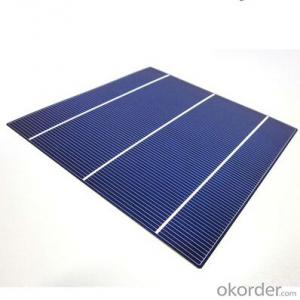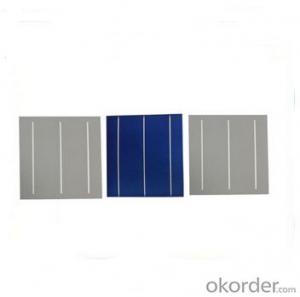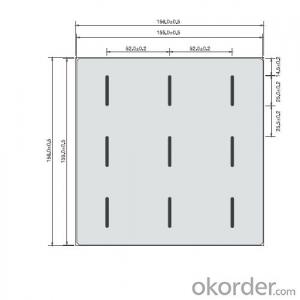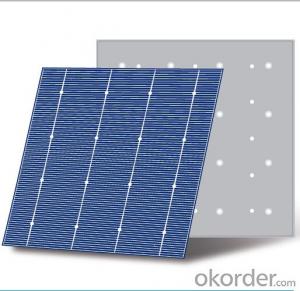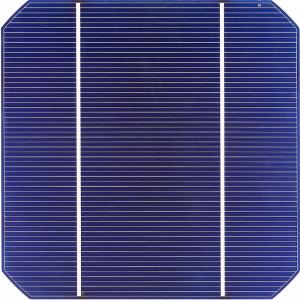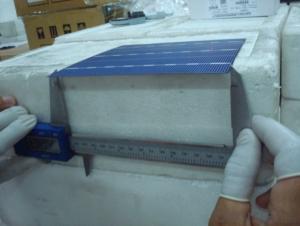Low Cost Polycrystalline Solar Cells High Quality 16.40-18.20
- Loading Port:
- Shanghai
- Payment Terms:
- TT OR LC
- Min Order Qty:
- 1000 pc
- Supply Capability:
- 100000 pc/month
OKorder Service Pledge
OKorder Financial Service
You Might Also Like
Solar Cells:
Solar cells is made by solar wafer, it has three categories of solar cell right now, monocrystalline polycrystalline and thin film,These cells are entirely based around the concept PN junction, which is the critical part of solar module, it is the part that can convert the light energy into electricity, the thickness is from 180um to 200um, with even busbars to conduct electricity, textured cell can decrease diffuse reflection; they are often electrically connected and encapsulated as a module. Photovoltaic modules often have a sheet of glass on the front (sun up) side, allowing light to pass while protecting semiconductor wafers from abrasion and impact due to wind-driven debris, rain, hail, etc. Solar cells are also usually connected in series in modules, creating an additive voltage. Connecting cells in parallel will yield a higher current;With high quality and stable quality. Our Cells can greatly improve the performance of Solar Modules.
Features:
1. High conversion efficiencies resulting in superior power output performance.
2. Outstanding power output even in low light or high temperature conditions
3. Optimized design for ease of soldering and lamination
4. Long-term stability, reliability and performance
5. Low breakage rate
6. Color uniformity
Solar Cells Advantage:
• High efficiency and stable performance in photovoltaic conversion.
• Advanced diffusion technique ensuring the homogeneity of energy conversion efficiency of the cell.
• Advanced PECVD film forming, providing a dark blue silicon nitride anti-reflection film of homogenous color and attractive appearance.
• High quality metal paste for back surface and electrode, ensuring good conductivity, high pulling strength and ease of soldering.
• High precision patterning using screen printing, ensuring accurate busbar location for ease with automatic soldering a laser cutting.
Specifications:
Model | Efficiency | Power | Max Power Current | Min Power Current | Max Power Voltage | Short Circuit Current | Open Circuit Voltage |
Eff(%) | Ppm(W) | Ipm(A) | Ipm(A) | Vpm(V) | Isc(A) | Voc(V) | |
156x156 P | 18.20-18.39 | 4.43 | 8.53 | 8.36 | 0.532 | 8.82 | 0.633 |
156x156 P | 18.00-18.19 | 4.38 | 8.40 | 8.26 | 0.529 | 8.78 | 0.630 |
156x156 P | 17.80-17.99 | 4.33 | 8.33 | 8.20 | 0.527 | 8.74 | 0.629 |
156x156 P | 17.60-17.79 | 4.28 | 8.29 | 8.08 | 0.524 | 8.70 | 0.628 |
156x156 P | 17.40-17.59 | 4.23 | 8.26 | 8.03 | 0.522 | 8.66 | 0.625 |
156x156 P | 17.20-17.39 | 4.19 | 8.22 | 7.99 | 0.520 | 8.61 | 0.623 |
156x156 P | 17.00-17.19 | 4.14 | 8.17 | 7.90 | 0.517 | 8.56 | 0.620 |
156x156 P | 16.80-16.99 | 4.09 | 8.13 | 7.85 | 0.515 | 8.51 | 0.618 |
156x156 P | 16.60-16.79 | 4.04 | 8.06 | 7.75 | 0.513 | 8.46 | 0.616 |
156x156 P | 16.40-16.59 | 3.99 | 7.97 | 7.74 | 0.511 | 8.40 | 0.614 |
Packaging & Delivery of Solar Cells
Carton Box Package and Deliver by air. It should be noticed that it should be avoid of water, sunshine and moist.
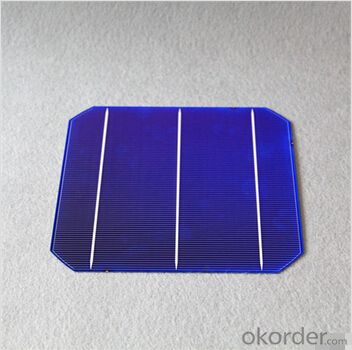
FAQ
We have organized several common questions for our clients,may help you sincerely:
①What price for each watt?
It depends on the efficiency of the solar cell, quantity, delivery date and payment terms.
②How long can we receive the product after purchase?
In the purchase of product within three working days, We will arrange the factory delivery as soon as possible. The pecific time of receiving is related to the state and position of customers.Commonly 7 to 10 working days can be served.
③Can you provide the peripheral products of the solar panels, such as the battery, controller, and inverter? If so, can you tell me how do they match each other?
Yes, we can, we have two companies for solar region, one is CNBM International, the other is CNBM engineering Co.
We can provide you not only the solar module but also the off grid solar system, we can also provide you service with on grid plant.
④What is your warranty of solar cell?
Our product can promise lower than 0.3% open box crack, we support claim after opening the box if it has crackm color difference or sth, the buyer should give pictures immediately, we can not accept the claim after the solar cell has assembled to solar panel.
• Timeliness of delivery
• ⑤How do you pack your products?
We have rich experience on how to pack the solar cell to make sure the safety on shipment, we could use wooden box or pallet as buyer's preference.
- Q: Can solar cells be used in powering electric boats?
- Yes, solar cells can be used to power electric boats. Solar panels can be installed on the boat's surface to capture sunlight and convert it into electricity. This clean and renewable energy source can charge the boat's batteries and power the electric motor, allowing for eco-friendly and sustainable boating.
- Q: Have you ever been to a solar cell power generation station?
- I know a company named SUNPOWER is famous for that.
- Q: How do solar cells perform in areas with high levels of dust?
- Solar cells can be affected by high levels of dust in areas. The accumulation of dust on the surface of solar cells can reduce their efficiency by blocking sunlight and reducing the amount of energy they can generate. Regular cleaning and maintenance are required to ensure optimal performance in dusty environments.
- Q: Can solar cells be used to power farms or agricultural operations?
- Yes, solar cells can be used to power farms or agricultural operations. Solar panels can be installed on rooftops, fields, or other suitable areas to convert sunlight into electricity. This renewable energy source can provide a consistent and sustainable power supply for various farming activities, such as irrigation systems, machinery, and storage facilities. Additionally, solar power helps reduce reliance on fossil fuels, lowers operational costs, and contributes to a greener and more environmentally friendly agricultural sector.
- Q: Can solar cells be used in water pumps?
- Yes, solar cells can be used in water pumps. Solar-powered water pumps utilize solar panels to convert sunlight into electricity, which can power the pump. This enables the pumps to operate independently of grid electricity, making them ideal for remote areas or locations with limited access to electricity. Solar-powered water pumps are cost-effective, environmentally friendly, and can be used for various applications such as agriculture, irrigation, or supply of clean drinking water.
- Q: Can solar cells be used for powering electric vehicle charging stations?
- Yes, solar cells can be used for powering electric vehicle charging stations. Solar panels can generate electricity from sunlight, which can then be used to charge electric vehicles at charging stations. This helps to reduce dependence on non-renewable energy sources and promotes the use of clean and sustainable energy for transportation.
- Q: Can solar cells be used in space stations?
- Yes, solar cells can be used in space stations. In fact, solar cells are commonly used in space stations to generate electricity by harnessing the energy from the sun. These solar cells are often integrated into the outer surface of the station to maximize sunlight exposure and provide a reliable source of power for various systems and equipment on board.
- Q: What is the impact of bird droppings on solar cell efficiency?
- Bird droppings can have a significant negative impact on solar cell efficiency. The droppings can create a layer of dirt and debris that blocks sunlight from reaching the solar cells, thereby reducing their ability to convert sunlight into electricity. This decrease in efficiency can lead to a decrease in overall power output, requiring more frequent cleaning and maintenance to ensure optimal performance of the solar panels.
- Q: How many types of solar cells are now being used in real life?
- 3 kinds of solar cells, Silicon-based, organic, chemical.
- Q: How are solar cells made?
- Solar cells are typically made using a process called photovoltaic manufacturing, which involves several steps. First, silicon, which is the main material used in solar cells, is extracted from silica, a component of sand. The extracted silicon is then purified and transformed into a crystal structure suitable for solar cell production. These silicon wafers are then cut into thin slices. Next, various layers of conductive materials and anti-reflective coatings are applied to the wafer, creating the necessary electrical properties and enhancing light absorption. Finally, electrical contacts are added to the cell, allowing the generated electricity to be collected and used.
Send your message to us
Low Cost Polycrystalline Solar Cells High Quality 16.40-18.20
- Loading Port:
- Shanghai
- Payment Terms:
- TT OR LC
- Min Order Qty:
- 1000 pc
- Supply Capability:
- 100000 pc/month
OKorder Service Pledge
OKorder Financial Service
Similar products
Hot products
Hot Searches
Related keywords
